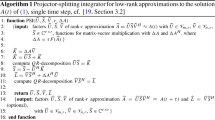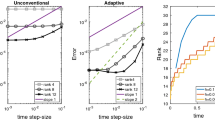Abstract
In this work we propose a low-rank solver in view of performing parameter estimation and uncertainty quantification in systems of partial differential equations. The solution approximation is sought in a space-parameter separated form. The discretisation in the parameter direction is made evolve in time through a Markov Chain Monte Carlo method. The resulting method is a Bayesian sequential estimation of the parameters. The computational burden is mitigated by the introduction of an efficient interpolator, based on a reduced basis built by exploiting the low-rank solves. The method is tested on four different applications.






















Similar content being viewed by others
Data Availability
The datasets generated during and/or analysed during the current study are available from the corresponding author on reasonable request.
References
Bellman, R., Åström, K.J.: On structural identifiability. Math. Biosci. 7(3–4), 329–339 (1970)
Stuart, A.M.: Inverse problems: a Bayesian perspective. Acta Numer. 19, 451–559 (2010)
Reich, S., Cotter, C.: Probabilistic Forecasting and Bayesian Data Assimilation. Cambridge University Press, Cambridge (2015)
Dashti, M., Stuart, A.M.: The Bayesian approach to inverse problems. In: Handbook of Uncertainty Quantification, pp. 311–428. Springer, Cham (2017)
Hoang, V.H., Schwab, C., Stuart, A.M.: Complexity analysis of accelerated MCMC methods for Bayesian inversion. Inverse Probl. 29(8), 085010 (2013)
Marzouk, Y.M., Najm, H.N.: Dimensionality reduction and polynomial chaos acceleration of Bayesian inference in inverse problems. J. Comput. Phys. 228(6), 1862–1902 (2009)
Giraldi, L., Le Maître, O.P., Mandli, K.T., Dawson, C.N., Hoteit, I., Knio, O.M.: Bayesian inference of earthquake parameters from buoy data using a polynomial chaos-based surrogate. Comput. Geosci. 21(4), 683–699 (2017)
Nagel, J.B., Sudret, B.: Spectral likelihood expansions for Bayesian inference. J. Comput. Phys. 309, 267–294 (2016)
Schwab, C., Stuart, A.M.: Sparse deterministic approximation of Bayesian inverse problems. Inverse Probl. 28(4), 045003 (2012)
Shao, Q., Younes, A., Fahs, M., Mara, T.A.: Bayesian sparse polynomial chaos expansion for global sensitivity analysis. Comput. Methods Appl. Mech. Eng. 318, 474–496 (2017)
Yan, L., Zhou, T.: Adaptive multi-fidelity polynomial chaos approach to Bayesian inference in inverse problems. J. Comput. Phys. 381, 110–128 (2019)
Ma, X., Zabaras, N.: An efficient Bayesian inference approach to inverse problems based on an adaptive sparse grid collocation method. Inverse Probl. 25(3), 035013 (2009)
Nguyen, N., Rozza, G., Huynh, D.P., Patera, A.T.: Reduced basis approximation and a posteriori error estimation for parametrized parabolic PDEs: application to real-time Bayesian parameter estimation. In: Large-Scale Inverse Problems and Quantification of Uncertainty, pp. 151–177 (2010)
Boyaval, S.: A fast Monte-Carlo method with a reduced basis of control variates applied to uncertainty propagation and Bayesian estimation. Comput. Methods Appl. Mech. Eng. 241, 190–205 (2012)
Cui, T., Marzouk, Y.M., Willcox, K.E.: Data-driven model reduction for the Bayesian solution of inverse problems. Int. J. Numer. Methods Eng. 102(5), 966–990 (2015)
Chen, P., Schwab, C.: Sparse-grid, reduced-basis Bayesian inversion. Comput. Methods Appl. Mech. Eng. 297, 84–115 (2015)
Chen, P., Ghattas, O.: Stein variational reduced basis Bayesian inversion. SIAM J. Sci. Comput. 43(2), 1163–1193 (2021)
Huang, D.Z., Huang, J., Reich, S., Stuart, A.M.: Efficient derivative-free Bayesian inference for large-scale inverse problems. arXiv preprint arXiv:2204.04386 (2022)
Cui, T., Dolgov, S., Zahm, O.: Scalable conditional deep inverse Rosenblatt transports using tensor-trains and gradient-based dimension reduction. arXiv (2023)
Del Moral, P.: Feynman–Kac Formulae: Genealogical and Interacting Particle Systems with Applications, vol. 88. Springer, New York (2004)
Särkkä, S.: Bayesian Filtering and Smoothing, vol. 3. Cambridge University Press, New York (2013)
Fox, C., Norton, R.A., Morrison, M.E.K., Molteno, T.C.A.: In: de Gier, J., Praeger, C.E., Tao, T. (eds.) Sequential Bayesian Inference for Dynamical Systems Using the Finite Volume Method, pp. 13–23. Springer, Cham (2019)
Doucet, A., Godsill, S., Andrieu, C.: On sequential Monte Carlo sampling methods for Bayesian filtering. Stat. Comput. 10(3), 197–208 (2000)
Chen, Z.: Bayesian filtering: from Kalman filters to particle filters, and beyond. Statistics 182(1), 1–69 (2003)
Evensen, G.: The ensemble Kalman filter: theoretical formulation and practical implementation. Ocean Dyn. 53(4), 343–367 (2003)
Ernst, O.G., Sprungk, B., Starkloff, H.-J.: Analysis of the ensemble and polynomial chaos Kalman filters in Bayesian inverse problems. SIAM/ASA J. Uncertain. Quantif. 3(1), 823–851 (2015)
Pagani, S., Manzoni, A., Quarteroni, A.: Efficient state/parameter estimation in nonlinear unsteady PDEs by a reduced basis ensemble Kalman filter. SIAM/ASA J. Uncertain. Quantif. 5(1), 890–921 (2017)
Silva, F.A., Pagliantini, C., Grepl, M., Veroy, K.: A reduced basis ensemble Kalman method. arXiv preprint arXiv:2210.02279 (2022)
Bachmayr, M., Cohen, A., Dahmen, W.: Parametric PDEs: sparse or low-rank approximations? IMA J. Numer. Anal. 38(4), 1661–1708 (2018)
Nouy, A.: A priori model reduction through proper generalized decomposition for solving time-dependent partial differential equations. Comput. Methods Appl. Mech. Eng. 199(23–24), 1603–1626 (2010)
Chinesta, F., Ladevèze, P.: Separated representations and PGD-based model reduction. Fundam. Appl. Int. Centre Mech. Sci. Courses Lect. 554, 24 (2014)
Khoromskij, B.N., Schwab, C.: Tensor-structured Galerkin approximation of parametric and stochastic elliptic PDEs. SIAM J. Sci. Comput. 33(1), 364–385 (2011)
Zhang, Z., Yang, X., Oseledets, I.V., Karniadakis, G.E., Daniel, L.: Enabling high-dimensional hierarchical uncertainty quantification by ANOVA and tensor-train decomposition. IEEE Trans. Comput. Aided Des. Integr. Circuits Syst. 34(1), 63–76 (2014)
Ballani, J., Grasedyck, L.: Hierarchical tensor approximation of output quantities of parameter-dependent PDEs. SIAM/ASA J. Uncertain. Quantif. 3(1), 852–872 (2015)
Dolgov, S., Scheichl, R.: A hybrid alternating least squares-TT-cross algorithm for parametric PDEs. SIAM/ASA J. Uncertain. Quantif. 7(1), 260–291 (2019)
Khoromskij, B.N., Oseledets, I.: Quantics-TT collocation approximation of parameter-dependent and stochastic elliptic PDEs. Comput. Methods Appl. Math. 10(4), 376–394 (2010)
Sapsis, T.P., Lermusiaux, P.F.: Dynamically orthogonal field equations for continuous stochastic dynamical systems. Physica D 238(23–24), 2347–2360 (2009)
Sapsis, T.P., Lermusiaux, P.F.J.: Dynamical criteria for the evolution of the stochastic dimensionality in flows with uncertainty. Physica D 241(1), 60–76 (2012)
Musharbash, E., Nobile, F., Zhou, T.: Error analysis of the dynamically orthogonal approximation of time dependent random PDEs. SIAM J. Sci. Comput. 37(2), 776–810 (2015)
Cheng, M., Hou, T.Y., Zhang, Z.: A dynamically bi-orthogonal method for time-dependent stochastic partial differential equations I: derivation and algorithms. J. Comput. Phys. 242, 843–868 (2013)
Choi, M., Sapsis, T.P., Karniadakis, G.E.: On the equivalence of dynamically orthogonal and bi-orthogonal methods: theory and numerical simulations. J. Comput. Phys. 270, 1–20 (2014)
Koch, O., Lubich, C.: Dynamical low-rank approximation. SIAM J. Matrix Anal. Appl. 29(2), 434–454 (2007)
Ceruti, G., Kusch, J., Lubich, C.: A rank-adaptive robust integrator for dynamical low-rank approximation. BIT Numer. Math. 62, 1–26 (2022)
Benner, P., Onwunta, A., Stoll, M.: Low-rank solution of unsteady diffusion equations with stochastic coefficients. SIAM/ASA J. Uncertain. Quantif. 3(1), 622–649 (2015)
Benner, P., Dolgov, S., Onwunta, A., Stoll, M.: Low-rank solvers for unsteady stokes-brinkman optimal control problem with random data. Comput. Methods Appl. Mech. Eng. 304, 26–54 (2016)
Stoll, M., Breiten, T.: A low-rank in time approach to PDE-constrained optimization. SIAM J. Sci. Comput. 37(1), 1–29 (2015)
Kressner, D., Tobler, C.: Low-rank tensor Krylov subspace methods for parametrized linear systems. SIAM J. Matrix Anal. Appl. 32(4), 1288–1316 (2011)
Metropolis, N., Rosenbluth, A.W., Rosenbluth, M.N., Teller, A.H., Teller, E.: Equation of state calculations by fast computing machines. J. Chem. Phys. 21(6), 1087–1092 (1953)
Hastings, W.K.: Monte Carlo sampling methods using Markov chains and their applications. Biometrika 57(1), 97–109 (1970)
Eckart, C., Young, G.: The approximation of one matrix by another of lower rank. Psychometrika 1(3), 211–218 (1936)
Saad, Y., Schultz, M.H.: GMRES: a generalized minimal residual algorithm for solving nonsymmetric linear systems. SIAM J. Sci. Stat. Comput. 7(3), 856–869 (1986)
Dolgov, S.V.: TT-GMRES: solution to a linear system in the structured tensor format. Russ. J. Numer. Anal. Math. Model. 28(2), 149–172 (2013)
Ballani, J., Grasedyck, L.: A projection method to solve linear systems in tensor format. Numer. Linear Algebra Appl. 20(1), 27–43 (2013)
Weinhandl, R., Benner, P., Richter, T.: Low-rank linear fluid-structure interaction discretizations. ZAMM-Journal of Applied Mathematics and Mechanics/Zeitschrift für Angewandte Mathematik und Mechanik 100(11), e201900205 (2020)
Barrault, M., Maday, Y., Nguyen, N.C., Patera, A.T.: An empirical interpolation method: application to efficient reduced-basis discretization of partial differential equations. C.R. Math. 339(9), 667–672 (2004)
Chaturantabut, S., Sorensen, D.C.: Nonlinear model reduction via discrete empirical interpolation. SIAM J. Sci. Comput. 32(5), 2737–2764 (2010)
Sirovich, L.: Turbulence and the dynamics of coherent structures. I. Coherent structures. Q. Appl. Math. 45(3), 561–571 (1987)
Berkooz, G., Holmes, P., Lumley, J.L.: The proper orthogonal decomposition in the analysis of turbulent flows. Annu. Rev. Fluid Mech. 25(1), 539–575 (1993)
Farhat, C., Chapman, T., Avery, P.: Structure-preserving, stability, and accuracy properties of the energy-conserving sampling and weighting method for the hyper reduction of nonlinear finite element dynamic models. Int. J. Numer. Methods Eng. 102(5), 1077–1110 (2015)
Badia, S., Nobile, F., Vergara, C.: Fluid-structure partitioned procedures based on Robin transmission conditions. J. Comput. Phys. 227, 7027–7051 (2008)
Fernández, M.A., Mullaert, J., Vidrascu, M.: Generalized Robin-Neumann explicit coupling schemes for incompressible fluid-structure interaction: stability analysis and numerics. Int. J. Numer. Methods Eng. 101(3), 199–229 (2015)
Burman, E., Fernández, M.A.: Stabilization of explicit coupling in fluid–structure interaction involving fluid incompressibility. Comput. Methods Appl. Mech. Eng. 198(5–8), 766–784 (2009)
Brezzi, F., Pitkäranta, J.: On the stabilization of finite element approximations of the Stokes equations. Notes Numer. Fluid Mech., 10, 11–19. Vieweg (1984)
Brand, M.: Fast low-rank modifications of the thin singular value decomposition. Linear Algebra Appl. 415(1), 20–30 (2006)
Acknowledgements
The first author acknowledges support by Inria through the PEPR “SantéNumérique”. The third author acknowledges support from ANR Grant ADAPT 18-CE46-0001.
Funding
The first author was financially supported by Inria through the PEPR Santé Numérique program.
Author information
Authors and Affiliations
Corresponding author
Ethics declarations
Conflict of interest
The authors declare that they have no conflict of interest.
Additional information
Publisher's Note
Springer Nature remains neutral with regard to jurisdictional claims in published maps and institutional affiliations.
Appendices
SVD of a Second-Order Tensor
Truncated Preconditioned GMRES Algorithm
In order to limit memory footprint, Algorithm 3 can also be restarted using the final iterate as initial guess if the maximum number of iterations is reached without converging.
Brand’s Algorithm
Brand’s algorithm [64]
Rights and permissions
Springer Nature or its licensor (e.g. a society or other partner) holds exclusive rights to this article under a publishing agreement with the author(s) or other rightsholder(s); author self-archiving of the accepted manuscript version of this article is solely governed by the terms of such publishing agreement and applicable law.
About this article
Cite this article
Riffaud, S., Fernández, M.A. & Lombardi, D. A Low-Rank Solver for Parameter Estimation and Uncertainty Quantification in Time-Dependent Systems of Partial Differential Equations. J Sci Comput 99, 34 (2024). https://doi.org/10.1007/s10915-024-02488-3
Received:
Revised:
Accepted:
Published:
DOI: https://doi.org/10.1007/s10915-024-02488-3







